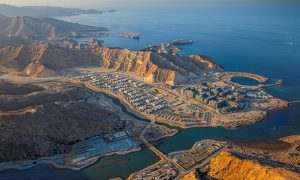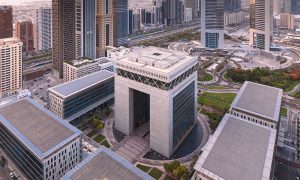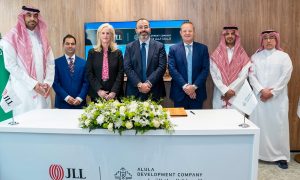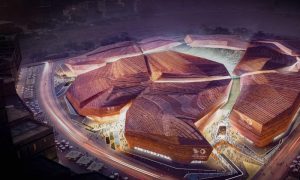2011: The year in headlines
2011’s top five stories on TheBigProjectME.com

The top 5 online stories from TheBigProjectME.com
Kingdom Tower
Last year saw the first tenders launched for Saudi Arabia’s ‘mile high’ Kingdom Tower – Chicago-based architecture practice Smith+Gill confirmed it has designed Saudi Arabia’s Kingdom Tower; planned to stand 173m higher than Dubai’s Burj Khalifa.
It will stand at more than 1000 metres and occupy a total construction area of 530,000 square meters (5.7 million square feet), Kingdom Tower will be the centerpiece and first construction phase of the Kingdom City development on a 5.3 million-square-meter site in north Jeddah.
“This tower symbolizes the Kingdom as an important global business and cultural leader, and demonstrates the strength and creative vision of its people. It represents new growth and high-performance technology fused into one powerful iconic form,” said partner Adrian Smith, whose experience in supertall tower design with previous firm SOM included Jin Mao Tower in Shanghai, Nanjing Greenland Financial Center in Nanjing, China, the Trump International Hotel and Tower in Chicago and Pearl River Tower, now in the late stages of construction in Guangzhou, China.
Taipei 101 becomes world’s tallest green building
Six years after it set its first record for being the world’s tallest building – and 18 months after that record was broken by Burj Khalifa – Taipei 101 became the world’s tallest greenest building, following a retrofit programme
The 508 metre supertall is the first supertall to achieve LEED accreditation – platinum standard. Now in the top 5% of the top 5% of green buildings in the world, the Taipei 101 holds records for the tallest, largest and also highest occupancy green building in existence.
Mark MacCracken, who announced the tower as the world’ tallest and largest LEED certified building at the official ceremony, said: “New buildings get a lot of attention especially in this part of the world where 40 billion square feet is being added over the next 20 years But retrofit will have to happen to the old buildings make a dent in the greening of this planet.”
Qatar begins 2022 infrastructure projects
On November 23 2011, Qatar’s Public Works Authority, Asghal signed it’s largest contract to date for the nation-wide infrastructure projects that will lay the foundations for hte 2022 World Cup tournament.
Hyder Consulting signed the largest single contract – also the largest contract in the firm’s own history.
The Interconnected infrastructure network will be delivered over the next five years, covering all five zones of the Gulf state.
The project focuses on establishing road networks and wastewater treatment facilities as part of the Qatar’s National Development Plan, and lays the foundations for meeting development targets ahead of the World Cup.
“This is an important milestone in the infrastructure of the state of Qatar. I think this strategy and the value of the agreement we have signed today with leading consultants, shows the commitment of the state of Qatar towards developing the infrastructure of the country,” said president of the public works authority, Engr. Nasser Ali Al-Mawalawi at the signing.
Other companies involved in the development programme include Parons Brinkerhoff International, Khatib and Alami,
WSP UK, Parsons International, WS Atkins and Partners Overseas and CH2MHill
Etihad Rail on track
Following years of plans – and criticism – the GCC officially announced that Etihad Rail would build the first nation-wide rail network by 2017.
The project is truly international with sleeper contracts awarded to Indian concrete manufacturer PCM Strescon Overseas Ventures Limited (PCM Strescon), and trains by American Electro-Motive Diesels. “Technical know how” will be provided by du and Etisalat signed an MoU with Etihad to share best practices in communication.
Etihad – formed under mandate by the government of Abu Dhabi in 2009 – originally operated as Union Rail and is headed by former chief executive of National Express Group and former chairman and chief executive of the Strategic Rail Authority, Richard Bowker. Bowker’s work in the UK also included London Underground.
“The Etihad Rail network is one of the country’s most significant strategic projects,” said Etihad Rail vice chair, Mattar Al Tayer.
“It will contribute to the environmental sustainability, economic growth and social development of the UAE.”
Saudi Arabia’s Nitaqat scheme
One of 2011’s most popular stories on TheBigProjectme.com, the news that Saudi Arabia may cap expatriate visas in order to promote nationalisation policies, caused a storm among construciton’s expat community, across the Gulf.
Under the new legislation – the Nitaqat scheme – the proposed six year visa could not be extended despite more than 80% of those in the Kingdom being non-nationals. The unemployement rate in the Kingdom currently stands at 10.5%
The labour scheme states all firms in the country must employ a minimum of 10% Saudi Arabian nationals.
In a statement, John Leonard Monterona, Migrante Middle East regional coordinator is reported as saying the scheme “is the right decision or action a government could do if it faces high rate of unemployment among its own citizens”.
“Since the political troubles happened early in 2011, all the GCC countries have had a big drive to try and get locals into work and avoid further unrest. Not just government but private sector also,” said MacDonald and Co director of recruitment, Ben Waddilove.


















